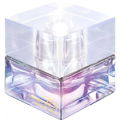04/13/2021

Elysium
891 Reviews

Elysium
Helpful Review
10
Lucida: The Brightest Star In A Constellation
Juniperus oxycedrus, called vernacular Cade, juniper falls, thorny juniper, thorny cedar, or sharp cedar, is a species of wild juniper. It is native to the Mediterranean region from Morocco and Portugal, from the north to the south of France, from the east to westernmost Iran, and south to Lebanon and Israel. The specific epithet oxycedrus means "sharp cedar," and this species may have been the ancient Greeks' original cedar or cedar. For generations, Provencal shepherds have handed down from father to son the secrets of Cade wood, a symbol of a tenacious character and strong tradition and generosity values. Strictly, Cade Oil is identical to Juniper Tar, got by destructive distillation of the wood from Juniperus oxycedrus. So, it is a dark, orange-brown, aromatic distillate from the bark of this wild tree and has a beautiful smokey aroma reminiscent of a summer campfire. They limit its use in perfumery to situations where a smoky-leathery, woody-phenolic, dry, and warm note is called for. Bois D’Olivier & Cade is a virile fragrance based on the totality of Juniperus oxycedrus. Juniper berries and the associated olfactory note often come from this tree. Still, the whole tree is represented here, from the berries to the coniferous needles; the oil spill from the wood itself is also described in some perfumes as "juniper" instead of juniper berries.
Bois D'Olivier & Cade is a spicy, fougére, woody fragrance with fresh and herbaceous notes, which evokes the arid woods, red earth, and hot stones found in the sunny landscape of the Garriga in the south of France. The opening is lemon zest and apple pulp, beautiful and sharp. There is instantaneously a bit of juniper sweetness in the heart popping up early, but it's not the center of attention. Well, juniper berries are famous for the flavor they give to gin and their antiseptic properties, not here. Instead, the aromatic aspect of lavender leads, rather fragrant and balsamic, made sweeter by a pinch of jasmine flowers. It's a manly start, jerky, a little tart, and a little aromatic, without being too citrusy. And then a powdery accord is there to soften the effect.
According to the official pyramid, olive wood and marine accords combine with juniper berries, and what I get here is the round warmth of the pepper notes not mentioned. The aquatic deal is not salty, similar to seaweed or shells, but more watery and smoky, as if you've poured seawater over a beach bonfire. The dirty notes of patchouli come to me vaguely, perhaps only hinted at to give structure to the heart without becoming the protagonist. And anyway, these reflex chords fold into the juniper wood, which becomes stronger and stronger.
Creamy sandalwood and a small puff of earthy vetiver come out at the end to form the finish. There is a smokiness, woodsy, piney aroma; masculine and rustic, spotless. From the beginning, I perceived a vanilla-like and burnt note, similar to that of charcoal, and I pretend there is a dose of roasted tonka.
Ultimately, it reminds me a lot of Boss' Hugo, not a clone, but something that shares a similar vibe to Boss' DNA. The octagonal-shaped bottle with orange-brown lacquered glass is emblematic of the Jeanne en Provence range for men. Usage time is medium; it lasts a long time on the skin, with a moderate sillage. I would use Bois D'Olivier & Cade in autumn or early spring, where the woody and aromatic themes seem louder on the nose and strictly in a casual sense. For the office, it is not an overbearing scent, so it does not disturb. What can I say? It is another delightful discovery to add to the autumn/winter collection.
I based the review on a 100ml bottle I have owned since November 2020.
-Elysium
Bois D'Olivier & Cade is a spicy, fougére, woody fragrance with fresh and herbaceous notes, which evokes the arid woods, red earth, and hot stones found in the sunny landscape of the Garriga in the south of France. The opening is lemon zest and apple pulp, beautiful and sharp. There is instantaneously a bit of juniper sweetness in the heart popping up early, but it's not the center of attention. Well, juniper berries are famous for the flavor they give to gin and their antiseptic properties, not here. Instead, the aromatic aspect of lavender leads, rather fragrant and balsamic, made sweeter by a pinch of jasmine flowers. It's a manly start, jerky, a little tart, and a little aromatic, without being too citrusy. And then a powdery accord is there to soften the effect.
According to the official pyramid, olive wood and marine accords combine with juniper berries, and what I get here is the round warmth of the pepper notes not mentioned. The aquatic deal is not salty, similar to seaweed or shells, but more watery and smoky, as if you've poured seawater over a beach bonfire. The dirty notes of patchouli come to me vaguely, perhaps only hinted at to give structure to the heart without becoming the protagonist. And anyway, these reflex chords fold into the juniper wood, which becomes stronger and stronger.
Creamy sandalwood and a small puff of earthy vetiver come out at the end to form the finish. There is a smokiness, woodsy, piney aroma; masculine and rustic, spotless. From the beginning, I perceived a vanilla-like and burnt note, similar to that of charcoal, and I pretend there is a dose of roasted tonka.
Ultimately, it reminds me a lot of Boss' Hugo, not a clone, but something that shares a similar vibe to Boss' DNA. The octagonal-shaped bottle with orange-brown lacquered glass is emblematic of the Jeanne en Provence range for men. Usage time is medium; it lasts a long time on the skin, with a moderate sillage. I would use Bois D'Olivier & Cade in autumn or early spring, where the woody and aromatic themes seem louder on the nose and strictly in a casual sense. For the office, it is not an overbearing scent, so it does not disturb. What can I say? It is another delightful discovery to add to the autumn/winter collection.
I based the review on a 100ml bottle I have owned since November 2020.
-Elysium
2 Comments







 Top Notes
Top Notes  Lavender
Lavender Apple
Apple Jasmine
Jasmine Lemon zest
Lemon zest Heart Notes
Heart Notes  Cade juniper
Cade juniper Olive wood
Olive wood Marine notes
Marine notes Patchouli
Patchouli Base Notes
Base Notes  Sandalwood
Sandalwood Vetiver
Vetiver













 Tzapan
Tzapan Miedzinski90
Miedzinski90 RobbieX
RobbieX























